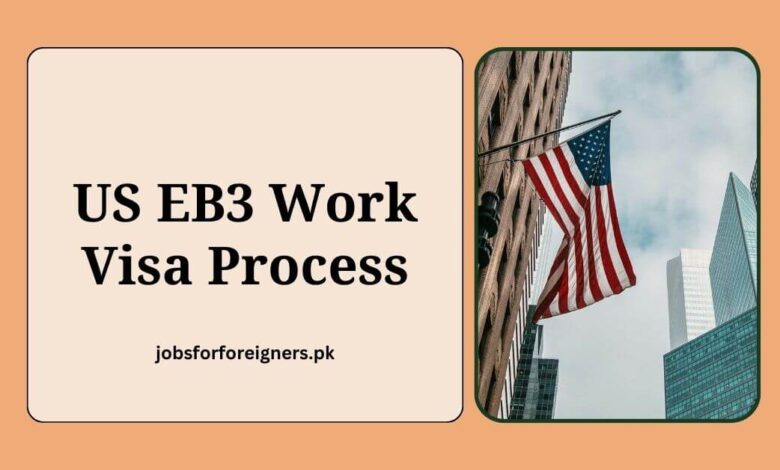US EB3 Work Visa Process 2025 – Apply Now

The EB3 category is one kind of employment-based immigrant visa. It serves as a path for professionals, skilled specialists, and unskilled workers to achieve permanent residency in the United States. Individuals motivated to apply for this visa category are often seeking employment opportunities and a long-term career in the U.S.
Candidates for the Employment-Based EB3 Visa in 2025 are permitted to work and live in the U.S. on a long-term basis. This visa category is open to skilled, knowledgeable, and unskilled workers from all over the world. Applicants from any country are eligible to apply for an EB-3 visa to enter the U.S.
Check Also: Caregiver Jobs in USA – H1B Visa Sponsorship
Key Points:
- Location: USA
- Visa Type: US EB3 Work Visa
- Salary Range: $40,000 to $90,000 per year
- Availability: For both skilled and unskilled workers
- Sponsorship: Yes
Understanding the EB3 Visa:
The EB3 visa category includes three subcategories, each with its own requirements and qualifications. These subcategories are:
1. Professionals (EB3(A)):
Professionals in this category require at least a U.S. bachelor’s degree or its foreign equivalent. Examples include architects, lawyers, physicians, engineers, and teachers.
Eligibility Requirements:
- A U.S. bachelor’s degree or its foreign equivalent.
- A job offer from a U.S. employer requiring a bachelor’s degree or higher.
- The job offer must be related to your area of expertise.
2. Skilled Workers (EB3(B)):
Skilled workers have at least two years of experience or training in their field. Examples include technicians, chefs, construction supervisors, journalists, graphic designers, and mold makers.
Eligibility Requirements:
- A minimum of two years of relevant experience or training.
- A job offer from a U.S. employer requiring your specific skills.
- The job must align with your training or experience.
3. Unskilled Workers (EB3(C)):
Unskilled workers perform tasks requiring less than two years of training or experience. Examples include nursing aides, agricultural workers, janitors, and maids.
Eligibility Requirements:
- Ability to perform unskilled work.
- A U.S. job offer requiring your abilities.
- The job must suit your skills.
Benefits:
- Permanent Residency:
EB-3 visa holders and their eligible family members can live and work permanently in the U.S. - Employment Opportunities:
EB-3 holders can work in a wide range of industries, including healthcare, technology, and education. - Flexibility in Job Categories:
The three subcategories allow eligibility for individuals with various education levels and professional backgrounds. - Bringing Family Members:
Spouses and unmarried children under 21 can obtain permanent residency. - Social Benefits and Services:
Access to education, healthcare, and other government programs for permanent residents. - Path to U.S. Citizenship:
After maintaining permanent residency for typically five years, visa holders can apply for U.S. citizenship.
Required Documents:
- Valid passport with at least six months’ validity.
- Passport-sized photographs.
- Birth certificate and educational transcripts.
- Tax payment records.
- Job offer from a U.S. employer.
- Labor certification from the U.S. Department of Labor.
- Medical examination records.
Application Process of US EB3 Work Visa Process 2025:
- Labor Certification: The U.S. employer must obtain labor certification from the Department of Labor.
- Filing the Petition: The employer files Form I-140 with USCIS on behalf of the applicant.
- Applying for Visa: After petition approval, the applicant submits Form DS-260.
- Visa Interview: Schedule and attend an interview at the U.S. consulate or embassy.
Sources and References:
- U.S. Citizenship and Immigration Services (USCIS)
- U.S. Department of Labor
- Legal consultations with immigration experts for latest updates and interpretations.
Frequently Asked Questions:
How long does it take to get an EB3 visa?
The processing time varies between one to three years, depending on the applicant’s country of origin and the USCIS backlog.
Is employer sponsorship required?
Yes, a job offer from a U.S. employer willing to sponsor the application is mandatory.
What is the cost of applying?
Costs include the I-140 filing fee ($700) and DS-260 form fee ($325), plus medical examination expenses.



